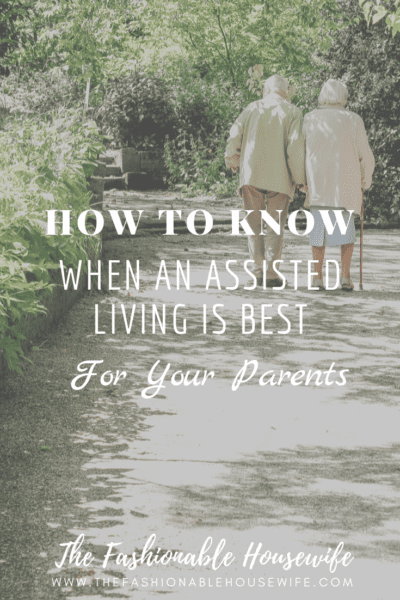
One of the hardest parts of being an adult is watching your parents get older. The very people who raised you and supported you when you were younger are now the ones in need of your support as they grow older. For lots of children of aging parents, watching their parents’ health decline can be a hard pill to swallow, and a lot will even be in denial about it but it’s important to pay attention to your parents’ behaviors and tendencies as they get older… it could actually help them to live longer and increase their quality of life.
In noticing some strange behaviors or tendencies from aging parents, you might feel like you can handle taking care of them because they’re not declining at a rapid pace; they only need a little bit of help with certain things. Because they only need a little bit of help you figure ou can do it… and that’s where everyone goes wrong. Their shortcomings that came with age seem minuscule but are actually a lot more daunting than you thought.
People tend to take on the responsibilities of taking care of their parents because they feel like an assisted living facility will not take as good of care of them as you would. Yes, there are communities that have had care issues and it has unfortunately given people the idea that ALL assisted living communities are like that when they’re really not. You just need to do your research and visit some local facilities in your area. That’s the only way you’re going to find the best-assisted living facility for your parents.
Assisted Living Facilities Aren’t What You Think They Are
Most children of aging parents tend to think that assisted living facilities are where elderly people go to die… that assumption couldn’t be more wrong. Assisted living facilities are exactly what the title says it is: it assists elders with every day living. This means that by putting your parents in an assisted living, they will still have their independence… they just need a little help with certain aspects of their life.
Things like taking their medicine and transportation but they don’t need help with much else. They can still go to the bathroom on their own and get showered and dressed. Some can even drive but even if they can’t, assisted living facilities have vans that will take them to the store and to doctor appointments, so they will still be mobile.
But before you start looking at assisted living facilities, make sure you recognize the signs of when it may be time to consider an assisted living for them. The last thing you want to do is get your parents worried and have them thinking that you’re going to put them in an assisted living facility over common mistakes that have nothing to do with a decline in their health. Take a look at some of the biggest signs that let you know it may be time to consider discussing the option of an assisted living facility with your parents.
You Notice Bruises on Your Parents
As we get older, our skin loses elasticity and becomes thin and easy to tear or bruise. If whenever you visit your parents, you begin to notice bruising on their arms, legs, or face, it’s a huge sign that your parents have experienced a few falls and depending on the location of the bruises, they’ve experienced some pretty bad falls. This is a major sign to consider assisted living facilities for your parents.
You See Old Food in Their Refrigerator
This is also a tell-tale sign that you may need to consider an assisted living for your parents. When you come over and find old food sitting in their fridge, it could be a sign that they’re not eating. It could be because they don’t remember to or it could be because they don’t have an appetite but regardless of the reason, transitioning your parents to an assisted living facility will ensure that they eat three meals a day.
If they’re not eating because they don’t have an appetite, they would be able to see a doctor who could prescribe them an appetite stimulant at an assisted living facility, plus there would be nurses there to make sure they take their medications too. According to the Alzheimer’s Association, seniors could be not eating for a variety of different reasons. Some of those reasons include:
- They don’t recognize certain foods anymore
- They may have on dentures that are painful to their gums when they chew food, making them not want to eat. Make sure that if they wear dentures, check them to make sure they fit properly.
- They may be losing their sense of taste and smell, making food not as appealing to them as it once was.
These are all signs and symptoms to be aware of when it comes to your parent’s eating habits. Check their refrigerator for old food and then, of course, talk to them. If there’s a food that you know they love but no longer eat it or crave it like they used to, then something could be going on cognitively.

They’re Not Taking Their Medicine
Once you start noticing out of character behaviors from your parents, it could be because they’re not taking their medications as often as they should. So how do you check to make sure they’re taking their medicine like they’re supposed to? Well, you could always ask them if they are but what do you think they’re going to say? They’re going to say that they have been taking their medicine… and they may even sass you for asking them “such a silly question.”
The best way to check is to check their medicine cabinet and pill bottles. Look at their medication bottle and then look at the date the prescription was filled and compare it to today’s date. In doing that, you should be able to count the number of pills in the bottle and see if it’s more than what it should be, based on when the prescription was filled. If there are more pills in the bottle than it should be, that means that they haven’t been taking their medicine as often as they should or at all.
No adult child wants to think about the day they need to consider elderly care services for their parents, but it’s better to know the signs to look for then to wait till it’s too late and they have an accident!



